Acknowledgements
With great thanks to the people who share their experiences with us, your voices are an important force for change.
And to our partners, funders and staff – without you, none of our work would be possible.
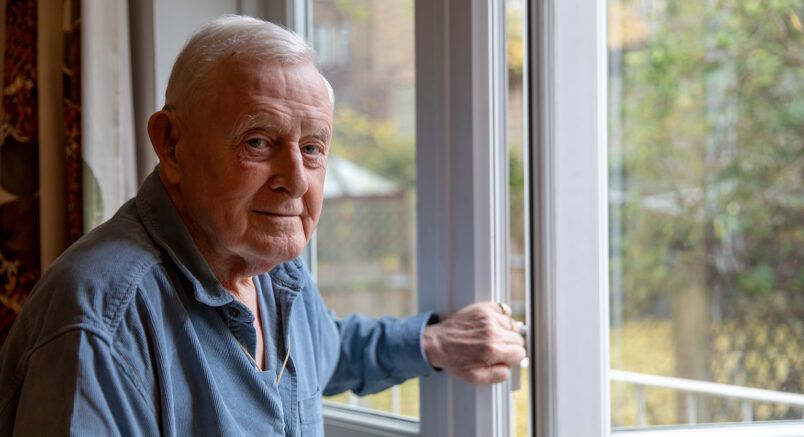
A message from our Chair, Dame Barbara Monroe
The right to make decisions, with confident and compassionate support from your healthcare team, and to have those decisions respected, are cornerstones of good end-of-life care.
People tell us they want to be in control of decisions about their treatment and care, but often are not given straightforward information, do not know what to ask for, or even that there are choices to make. Some will reach the end of their life without being given an opportunity to think about their options.
At Compassion in Dying we are helping to transform this, to improve what dying looks like in the UK. We are listening to what dying people tell us they want and need, supporting them, and amplifying their voices to change practice for the future.
In this report, you’ll find out what we achieved in 2024. To find out more about our finances, please see our latest annual report and accounts.
With great thanks to the people who share their experiences with us, your voices are an important force for change.
And to our partners, funders and staff – without you, none of our work would be possible.







Making my advance decision has enabled me to talk freely with my adult children about death and dying but it has also freed up a space for us all to discuss our deaths which has been great and has dispensed with fear and any awkwardness.
A caller to Compassion in Dying’s information line
We support people to make informed decisions, start honest conversations about death and dying with loved ones, and record and revisit their wishes whenever they want to.
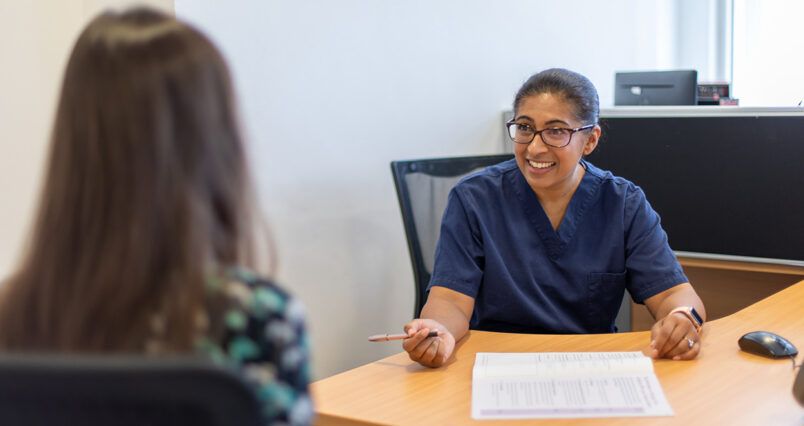
People often tell us they want to be in charge of decisions about their care and treatment, but find it difficult to get the information they need. Sometimes, they are also met with healthcare professionals unwilling to have open conversations about death and dying.
Our nurse-led information line is here to change that. We enable people to be in control of their end-of-life decisions and support them to plan ahead, in case a time comes when they cannot make decisions for themselves. We are here for everyone, whether they are preparing for the years ahead or need us right now.
Demand for the service consistently exceeds our capacity. This year over 4,400 people contacted us for information and support. This is a 10% increase in contacts compared to 2023, and a massive 63% increase from 2022.
Through our service people can make an:
In 2023 we set up a new service because people making complex treatment decisions or fighting for their loved ones’ wishes to be heard told us they could not find help when they needed it most.
People face problems like:
In 2024 call volumes to this new service tripled compared to the previous year.
Many of our callers were challenging decisions that were not lawful, and advocating for their loved ones. We gave people the information and support needed to draft letters, prepare for meetings and think through the questions they needed to ask.
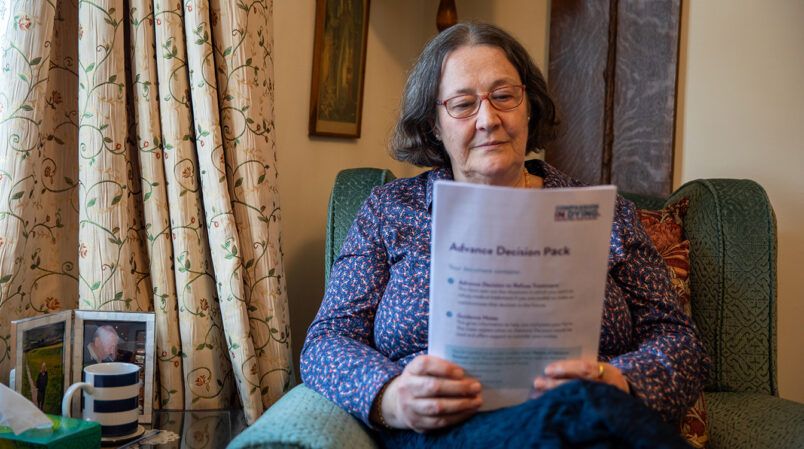
This service is helping to challenge the power imbalance people often tell us they face when medical decisions are being made about someone they love. We are helping to ensure individuals are at the centre of decisions about their care.
Dealing with my mum dying was a terrible shock; but to then be faced with no one caring about her wishes to refuse life sustaining treatment was traumatic. Before I found Compassion in Dying there was no one who could help me contextualise what was happening. When they picked up the phone it was like somebody threw me a lifeline. They gave me the information and suggestions I needed to engage with the system as her health attorney and fight for my mum’s wishes to be respected at the end of her life.
A caller to Compassion in Dying’s information line
Everything we do starts with what dying people tell us. We listen to what they say and amplify their voices. We shift attitudes and drive changes to the healthcare system. So people’s end-of-life decisions are heard, understood and respected when it matters most.
Dying people and those close to them tell us they are experiencing longer and more difficult deaths than they need to, due to a medical culture that prioritises extending life over allowing individuals to make an informed decision about whether they want this.
Based on the experiences of the people we support we’ve put forward clear and achievable recommendations that offer a new perspective on how to transform dying in the UK, by rebalancing end-of-life care in favour of people who experience it.
People who are experiencing end-of-life care have
told us:
8 in 10 want to prioritise their quality of life over living longer in the last years of their life
1 in 4 people say the last close friend or family member they know who died received medical treatment they would not have wanted
Based on the experiences of the people we support, we have put forward policy initiatives that are influencing how people understand and talk about their end-of-life treatment and care. We are supporting professionals to feel confident seeking people’s end-of-life wishes routinely and importantly, ensuring people are at the centre of decisions about their care.
Our landmark report was exclusively launched on Channel 4 News, featured within the British Medical Journal and Lord Darzi’s independent investigation of the NHS in England included our research as evidence of the societal change needed in end-of-life care.
And we are not stopping there. To build a safe and compassionate healthcare service that meets people’s needs and creates value for people at the end of life, we are committed to ensuring those developing the Government’s 10 Year Plan for Health listen to what people and communities need.
Many people tell us that they have poor experiences of do not attempt cardiopulmonary resuscitation (DNACPR) conversations and decisions. The impact is often significant and leaves a lasting mark on the lives of the people affected.
We were commissioned by the Parliamentary and Health Service Ombudsman (PHSO) to conduct research into older people’s experiences of DNACPR conversations and decisions.
The people we spoke to showed us that, when it comes to DNACPR decisions, there are tangible and deliverable changes that could be made to improve people’s experiences in the future. We amplified their voices by publishing a new report outlining what they want to see change for others in the future, which included:
What people told us helped to shape the PHSO’s recommendations. But getting this right now requires commitment from the government, commissioners, service providers and clinicians to understand what matters to people and their families.
We will continue to listen to the people we support and work with partner organisations to make sure that real experiences inform the improvement of policies and practice around DNACPR.
There needs to be training for all health practitioners, and the training should be about communication, and the absolutely vital need to be compassionate, to be respectful, and to have empathy.
A research participant
Almost everyone we speak to wants an easier way for healthcare professionals to see their end-of-life wishes. How and whether this vital information is available to clinicians when it matters most is a postcode lottery.
We hear time and again that people had bad experiences of end-of-life care because doctors did not know about their documented wishes and health information. Some relied on friends and family to ensure this information was not missed. Many also say they want it to be easier to see and update their own end-of-life records.
In 2024 we worked to influence how digital end-of-life records are delivered. We:
For too long digital end-of-life records have been built based on what systems and service providers require. Meaningful change in this space requires innovation that starts from what people themselves need.
We are calling for a digital end-of-life record that shares all health and care information required to support a patient across health and care settings and geographical boundaries, with a workforce that is supported to understand and use it. It’s vital that patients can edit the record and that families can access this information.
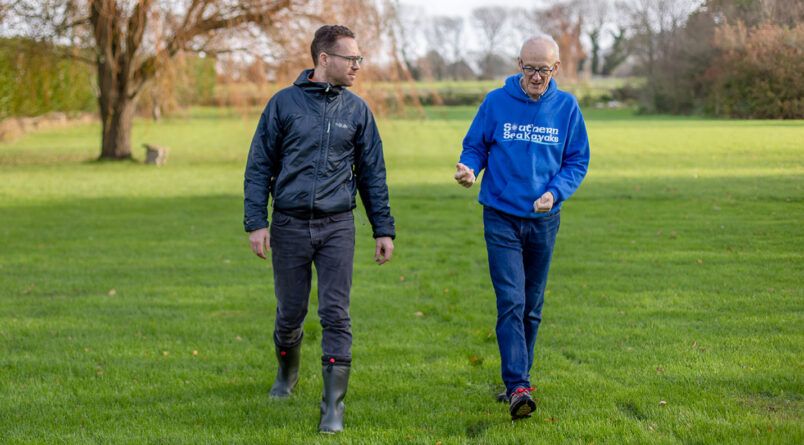
Thank you to the generous supporters and donors who make our work possible.
In the coming months, we will:
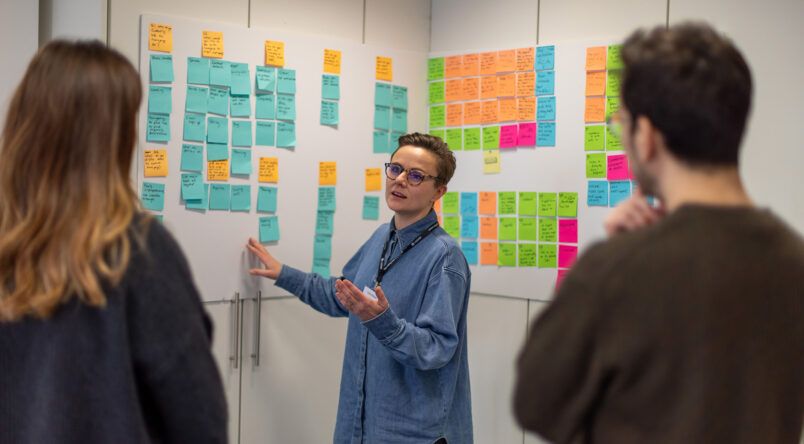
Together with our generous supporters, Compassion in Dying continues to grow, evolve and innovate. At the heart of what we do, our free, specialist nurse-led services provide unique support to ensure people’s wishes are both known about and respected at the end of life.
Our specialist knowledge is frequently called upon by both the public and professionals. It’s critical that we invest in additional clinical support for our services to meet this need.